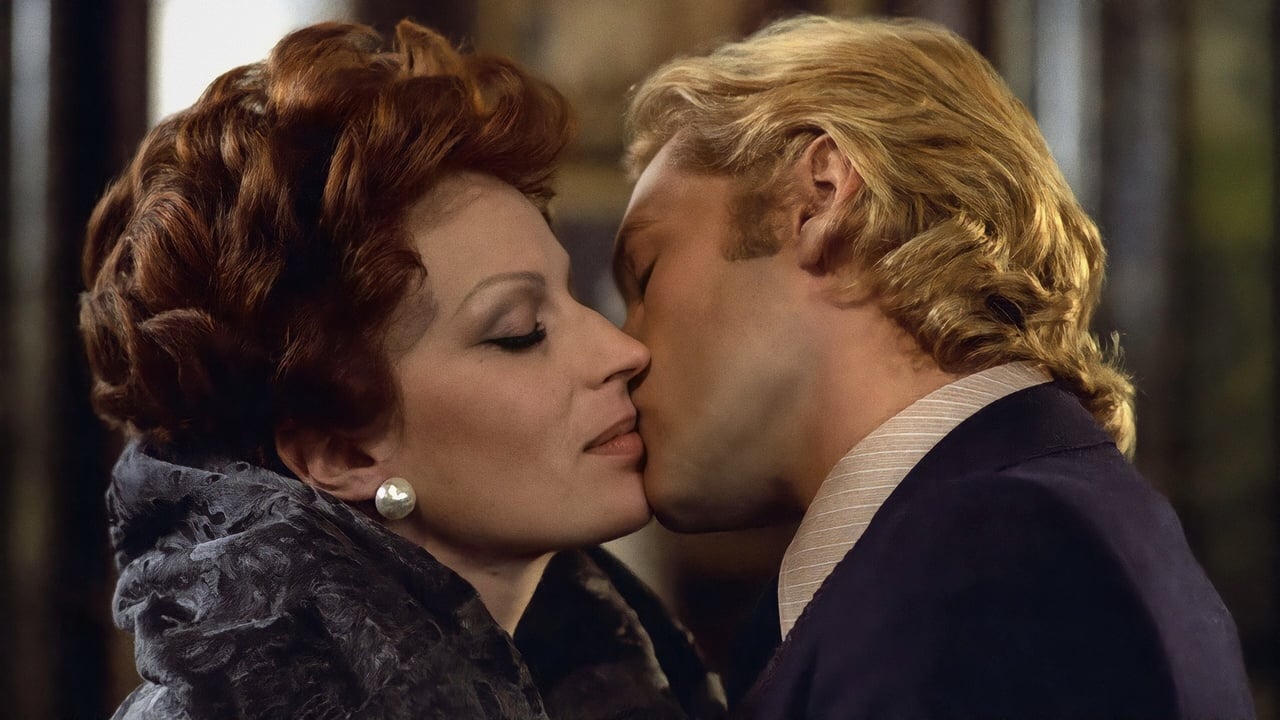

Luchino Visconti, ailing and partially paralyzed by a stroke a year or two before, managed to finish 'Conversation Piece' (the Italian title to me seems better -- 'A conversation inside a family). He called upon Burt Lancaster to play his protagonist, the retired American professor who has withdrawn from the world, devoting his hours to his passion of minor English 18 and 19 century art and to his books, in Rome. We see not the energetic hero of 'The Leopard', but a tired older man without qualities, in a well ordered arrangement of taste for tradition and patterns and philosophical musing. And his apartment is the embodiment of that world that is not only antiquated but which time has passed by. His is a bourgeois order that belongs in history books or literature. And into his quiet world burst with great energy is the modern temperament of a dysfunctional family of the upper class, filthy with money and decadent. The beautiful Sylvana Mangano is the marchesa who finagles the professor to rent a vacant apartment above his museum like apartment with its stuffy furniture, it corridors brimming with portraits of bucolic scenes from the English gentry or great men and family, It is in a sense as musty and locked away as the long f=vacant apartment he lets for the marchesa's kept German lover Conrad (Visocnti's own lover Helmut Berger), as well as her daughter and friend. And suddenly, the upper floor is transformed, as a contrast, with a modernism that is loud and vulgar and in stark contrast to the professor's mausoleum, as he quietly awaits death, as much as he values his solitude and the silence of his own carthusian-like order. The marchesa is temperamental, demanding and will have her way with her rent lover, if he doesn't slip through her greedy grasp. The professor's world is turned upside down, as he is drawn into this world of his madcap tenants. As such, images of his mother (Dominique Sanda) and his wife (Claudia Cardinale) in brief scenes bring him back to the world he has shunned. And with a turn of the wrist, Visconti has hooked up the older bourgeois order to the new one, but his professor remains aloof until it is too late. For, despite his reluctance, the marchesa, her daughter, her daughter's friend and mercurial Conrad, a refugee from the turbulent 1960 radicalism, in the professor's mind have become his 'adopted' family; yet, the professor maintains his value free mind and refused to become engaged and with responsibility, until the tragic end. And then you have to wonder. Somehow, 'Conversation Piece' sets off bells in our minds today: its vulgar display of money, the absence of responsibility, the money cultural of a decadent capitalist class. Visconti with a year or so from his own death still had a vision of his own class and its failure to live up to values it espoused. It won't please everyone's taste, but it is worth seeing for the curious.
... View MoreWhen the end credits rolled up all I could think of was Visconti trying to recreate the emotion and beauty of the last shot of his best film "The Leopard". You see Lancaster, sad and disconsolate - yet this time it didn't make me feel all that bothered.Lancaster plays here a very similar role; a sophisticated, old-fashioned and ageing Professor. He lives in great luxury in an exquisite villa in Rome. Everything seems perfect and serene until he is coaxed into renting an apartment to a decadent family.They behave terribly. They destroy a noble and humble abode into something crass and awfully tasteless. Yet, that is no surprise; the family comprises a sexually promiscuous daughter and her boyfriend, and a older woman who panders to a toy-boy played by Berger. They swear, play loud music, have no apparent sense of decency or morality. There is obviously a clash of belief systems here. Lancaster, an intellectual, well-educated and dour old man is confronted by the amoral youth of the 60s and 70s.I would normally love films like this. The 60s and 70s are periods that fascinate me greatly. I love Visconti as well, but somehow I get the feeling he was drying up creatively as I viewed this. The script is so heavy-handed sometimes, just the constant cliché that Berger plays is so drawn out and predictable - the angry Communist who just hates life and society, then the older gentleman with good manners who cannot comprehend the change around him and really does not want to understand it and finally the airy, vacuous daughter who seems completely bereft of depth or emotional sincerity. It all seems a little rushed and lacking in subtlety and the very theatrical performances from the mother and the daughter do not help whatsoever.Visconti was nearing the end of his life when he made this film, and in a way it shows - in two ways. Firstly, it seems that his zest was depleted, the screenplay and whole film are lacking in coherence and a clear structure, and secondly it appears that he was now a filmmaker in a period, a society, a culture that he did not like or comprehend. The decadence, the flamboyance and the hedonism of that time seemed to be overwhelming him; and in a sense like the framework of this film, he saw everything crumbling around him. For this alone, I could say at least watch it for the pretty pictures and a brief insight into the mind of a director who just felt lost and confused - with this film, society and with life itself.
... View MoreProfessor Lancaster leads a reclusive life in his art deco apartment, surrounded by classical paintings, books and memories. Along come new loud tenants who rent his upstairs apartment and force themselves onto the Professor who then questions his existence as a mixture of the old and new culture clash in intellectual wars and morals. Another interesting piece from Visconti's preoccupied topics of fallen aristocrats and the morality of life.
... View More"Gruppo di famiglia in un interno" has a special meaning for me, `cause it was the first Visconti`s film I`ve seen. It was a successful beginning for "Gruppo di famiglia" has concentrated all the most significant themes of his late works - death, solitude, disintegration of family and decay of traditional values, human searching for harmony in conditions of hostile environment and internal dissonance. I guess this movie is a kind of psychological puzzle - the director gives us some fragments of picture and a slight allusion how to make it up. So you'd better watch this movie several times ( at least two).Is it a precise sketch of decaying society or a drama of solitude and misunderstanding? I think both. The old Professor fenced himself off with beautiful pictures, classical music, exquisite trinkets. He seems disillusioned, he dislikes people and prefers things, they create. We conceive the environment from the Professor's viewpoint, the action of movie is restricted with his apartment - so we have exact and oppressive sensation of his voluntary hermit-existence, externally calm, but desperate like the Death. This measured life is abruptly broken off by the group of people - eccentric, tactless, obtrusive and noisy. Despite the Professor's resistance, the newcomers involve him in the storm of their passions and collisions. The epicenter of this storm is Conrad - an unscrupulous young man, a gigolo of the rich marchesa. But it's just one side of his figure, the first and quite deceitful impression. It also refers to other characters who turn out to be different from the impression they produce at first. The part of Conrad was gorgeously played by Helmut Berger who seems to embody in last films of Visconti the dangerous temptation of beauty - fatal for other people and finally for its owner. Suddenly it becomes evident that the unapproachable Professor dreams of family. The reality is pierced now and then by his reminiscences of the youth, of his mother, his young wife who'd left him (or he'd left her?). Those memories are always interrupted by irritating noise of his guests. The Professor exists at the joint of two realities and rush from one to the other with torment and hesitation. At last he realizes that feels more affection to those people with all their problems then to his exhausting reminiscences or imaginary interlocutors from "conversation pieces". He told sensitively: "It could have been my family!" Blinded with this unexpected affection he doesn't notice the doom sneering at him. He doesn't realize that he neither knows nor understands those people and there's very little time to achieve something new. There's only death ahead for him. That's why like a sudden intolerable blow he takes a suicide of Conrad who attracted the Professor most of others. Indeed Conrad is the least false figure in that "family". Beside his ruthless awareness the Professor looks like a naive idealist. His bedroom transformed into a hospital ward, a tape of cardiogram - it's a price he pays for his illusions.
... View More